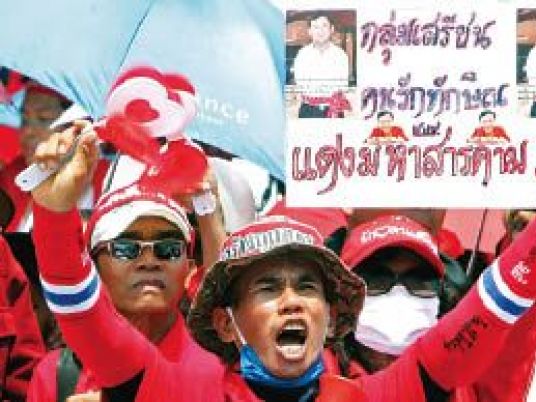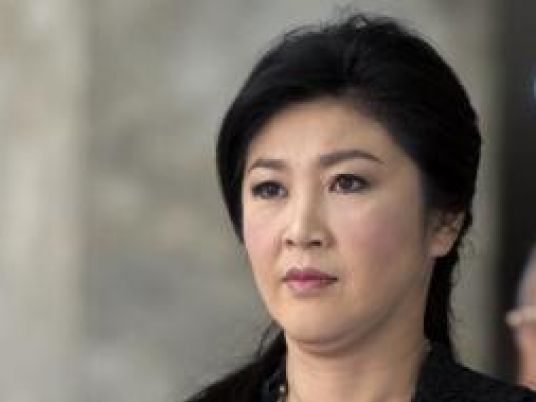Bangkok–The chief military adviser of Thailand’s anti-government protesters was injured in the head, after an explosion and bursts of automatic gunfire were heard near Bangkok’s business district on Thursday night.
Khattiya Sawasdipol, a suspended army specialist in charge of security at an encampment occupied by thousands of “red shirt” demonstrators, was admitted to an intensive care ward after being shot in the head, the state Narenthorn Emergency Medical Service and medical sources said.
Khattiya, better known as “Seh Daeng” (Commander Red) enjoys a cult following among some red shirts and soldiers, but has been dubbed a “terrorist” by Thailand’s government, which accuses him of involvement in dozens of grenade attacks that have injured more than 100 people.
“It’s a clear attempt to decapitate the red shirt military leadership,” said Anthony Davies, a security consultant with IHS-Jane’s.” “It’s a smart tactical move that will cause confusion in the red shirts’ military ranks and send a message to the leadership that if they don’t want to negotiate and come out, they can expect extreme consequences.”
Prime Minister Abhisit Vejjajiva is under enormous pressure to end the two-month standoff in central Bangkok that has killed 29 people, wounded more than 1,000, paralyzed parts of the capital and slowed growth in Southeast Asia’s second-biggest economy.
The prime minister on Wednesday canceled a proposed November 14 election under his “national reconciliation” plan and called off talks with protesters after they raised new demands.
The 22-member red shirt leadership council is an amalgam of radical former communists, academics, regional populists and aspiring lawmakers, making it difficult to reach consensus.
Some hardliners like Khattiya have advocated stepping up the protests to win the fight once and for all. Many face criminal charges for defying an emergency decree and some, like Khattiya, face terrorism charges carrying a maximum penalty of death.
The military had earlier said it was planning a huge lockdown around the fortified encampment of the red shirts, who are mostly supporters of former premier Thaksin Shinawatra who was ousted in a 2006 coup.
The army said it would deploy armored vehicles around the protesters’ 3 sq-km fortified encampment, stop them from entering the area, and urged businesses to close.
Army spokesman Sansern Kaewkamnerd said authorities will also seek cabinet approval to invoke a state of emergency in 15 northern and northeastern provinces, which are strongholds of the protesters to prevent any mobilization.
The mostly rural and urban poor protesters have adamantly refused to leave as their leaders challenged the government from behind medieval-like walls made from tires and wooden staves soaked in kerosene and topped by razor wire.
The government estimated the number of people in the encampment at 10,000 but Reuters witnesses put it at more than twice that number.
“We will send out groups to surround these vehicles to prevent them from advancing,” Jatuporn Prompan, a protest leader, told supporters.
Companies and embassies across the area told employees to leave work early and activated back-up plans for Friday. Several stations in an elevated train system were shutting early. Public transportation was being diverted from the area.
The mood at the protest site turned quickly from festive to tense on Thursday evening. Leaders took turns on the stage calling for more protesters to come to the encampment and threatened to lay siege to Abhisit’s house and an infantry barracks where he has taken refuge if there is a crackdown.
But an army source close to Army Chief Anupong Paochinda said an immediate crackdown to disperse the protesters was unlikely.
“It’s hard to say if or when the crackdown will be because we have to evaluate by the hour. We don’t want casualties so we have to keep the pressure up so people are too tired to resist.
“Casualties will be bad for us as well.”
The turmoil is shattering consumer confidence, a survey showed on Thursday, suggesting spending in shops and department stores is drying up as the crisis grinds on, a troubling sign for a sector that accounts for half the economy.
The University of the Thai Chamber of Commerce said its consumer confidence index fell by a record 2.6 points in April, the lowest since July 2009. Confidence has fallen for three straight months after rising steadily since the middle of 2009.
The Thai baht fell sharply immediately after the army’s announcement that it would try to isolate the encampment. Stocks fell one percent, while other Asian markets were up nearly 3 percent.
Foreign investors have turned negative since violence flared in April and have sold US$584 million in Thai shares in the past six sessions, cutting their net buying so far this year to US$607.6 million as of Wednesday.
“The markets have no idea what to make of the situation. It seems like we’re heading back to square one,” said Sukit Udomsirikul, a senior analyst at brokerage Siam City Securities.
The red shirts have said they would only disperse if a deputy prime minister faces criminal charges over a deadly April clash between troops and protesters.


